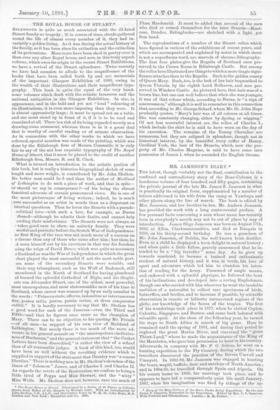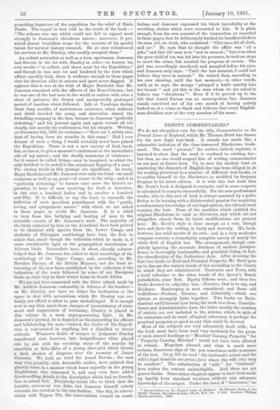MR. JAMESON'S DIARY.*
* Story of the Boar-Colima of the Ithain Pasha Itoliof E4podition. By the late James S. Jamoson, Naturalist to the Expedition. Baited by Mrs. J. S. J411105011. With Portrait and illustrations.' London: R. H. Porter. THE latest, though nrobably not the final, contribution to the- confused and contradictory story of the Rear-Column is a handsome volume of four hundred and fifty pages, containing the private journal of the late Mr. James S. Jameson in what is practically its original form, supplemented by a number of letters addressed to his wife from the camp at Yambuya and.. other places along the line of march. The book is edited by Mrs. Jameson, and her brother-in-law, Mr. Andrew Jameson, has provided the work with a long controversial preface. A few personal facts concerning a man whose name has recently been in everybody's mouth may not be out of place by way of introduction. James Sligo Jameson was born on August 17th,. 1856, at Alloa, Clackmannanshire, and died at Bangala, in 1888, on his thirty-second birthday. He was a grandson of Mr. John Jameson, of Dublin, the well-known Irish distiller. Even as a child he displayed a keen delight in natural history ;. and when quite a little fellow, gravely announced that he in- tended to be a big traveller " some day. As he grew up towards manhood, he became a trained and enthusiastic.. student of natural history, and it was, in truth, his love of sport and adventure which led him to abandon his inten- tion of reading for the Army. Possessed. of ample means,. and endowed with a splendid physique, he followed the bent of his inclinations, and developed into a roving Englishman,. though one who carried with him wherever he went the laudable • ambition of a naturalist to collect rare specimens of birds,. butterflies, and beetles, and to increase if possible, by scientific observation in remote or hitherto untraversed regions of the globe, our knowledge of the fauna of the tropics. The first of his wanderings took place in 1877, when he visited Ceylon,. Calcutta, Singapore, and Borneo, and came back ladened with scientific spoil. At the close of the following year, he turned his steps to South Africa in search of big game. Here he remained until the spring of 1881, and during that period he- explored the great Marie° River, and traversed the " great Thirst-Land," where he made the acquaintance of the King or the Matabeles, who gave him permission to hunt in his country.. Afterwards, in company with Mr. F. C. Selous, he went on a hunting expedition to the Fly Country, during which the two. travellers discovered. the junction of the Rivers Umvuli and Umnyati. In 1882.83, Mr. Jameson was engaged in hunting the bears, wapiti, buffalo, deer, and antelope of North America ; and in 1884.85, he travelled through Spain and Algeria. On his return home in 1885, his marriage took place, and he appears to have led a comparatively quiet life until January,. 1887, when his imagination was fired by tidings of the up- proaching departure of the expedition for the relief of Emin Pasha. The sequel is best told in the words of the book " The scheme was one which could not fail to appeal most strongly to Jameson's chivalrous nature; moreover, it pro- mised almost boundless scope for the exercise of his special talent for natural history research. He at once volunteered his services to Mr. Stanley, who readily accepted them."
An ardent naturalist as well as a keen sportsman, Jameson had thrown in his lot with Stanley in order—to borrow his eawn words—" to collect, and shoot meat for the Expedition," and though he was sore let and hindered by the turn which affairs speedily took, there is evidence enough in these pages that his devotion alike to science and sport never flagged. It appears that it was at the wish of Major Barttelot that Mr. Jameson remained with the officers of the Rear-Column ; but he was one of the last men in the world to endure with even a show of patience, the dreary and unexpectedly prolonged period of inaction which followed. Life at Yarabetya, during those long months of monotonous existence, when sickness and death invaded the camp, and starvation stared the dwindling company in the faze, became to Jameson "perfectly sickening," and his journal again and again reveals all too clearly, not merely his restlessness, but his chagrin. Writing on December 6th, 1887, he exclaims :—" Here am I, within nine days of having been six months in this camp ! Had I ever dreamt of such a thing, I would certainly never have joined the Expedition. There is not a new variety of bird, beast, fish, or insect, to give a moment's excitement to the naturalist's side of my nature ; and the deadly monotony of existence— for it cannot be called living—may be imagined, in which the only incident to be noted is the occasional flogging of a man." The closing words in this passage are significant. In truth, Major Barttelot and Mr. Jameson were only too fond—on small occasions as well as on great—of resort to the whip ; and it is "perfectly sickening," to borrow once more the latter's ex- pression, to hear of men receiving for theft or desertion, in one case a hundred lashes and in another a hundred and fifty. It is difficult, to say the least, to reconcile the infliction of such merciless punishment with the " gentle, 'loving, and sympathetic nature" with which we are asked in these pages to credit Mr. Jameson. It is a relief to turn from this bullying and beating of men to the scientific results of Mr. Jameson's work. The majority of the birds collected by him on the Aruwhimi have been proved to be identical with species from the Lower Congo, and students of Ethiopian ornithology have been the first to admit that, small though the collection which he made is, it casts considerable light on the geographical distribution of African birds. Naturalists have, in short, already acknow- ledged that Mr. Jameson has added to their knowledge of the ornithology of the Upper Congo, and, according to Mr. Bowdler Sharpe, of the British Museum, not the least in- teresting of the new facts established by the collection is the indication of the route followed by some of our European birds on their way to their winter home in South Africa.
We are not here concerned with the bitter attack made by Mr. Andrew Jameson—ostensibly in defence of his brother— en Mr. Stanley, nor have we either the inclination or the space to deal with accusations which Mr. Stanley can cer- tainly not afford to allow to pass unchallenged. It is enough now to say that, apart from charges of inconsistency of state- ment and suppression of testimony, Stanley is placed in this volume in a most unprepossessing light. In Mr. Jameson's journal, he is depicted as blackguarding his officers and belabouring his men,—indeed, the leader of the Expedi- tion is represented in anything but a dignified or heroic attitude. Whatever faults of temper or judgment Stanley manifested sink, however, into insignificance when placed Aide by side with the revolting story of the murder by .cannibals at Riba-Riba of a young slave-girl, which throws a dark shadow of disgrace over the memory of James Jameson. We hold no brief for Assad Ferran ; the man may very possibly, with detestable malice, have painted that ghastly scene in a manner which bears unjustly on the young Englishman who witnessed it, and may even have added bloodcurdling details to the description which had no founda- tion in actual fact. Everybody would like to think that the horrible statement was false, but Jameson himself calmly recounts the incident in his own fashion. One day, in conver- sation with Tippoo Tib, the conversation turned on canni- balism, and Jameson expressed his blank incredulity at the revolting stories which were recounted to him. It is plain enough, from his own account of the transaction as recorded in these pages, that he deliberately handed six handkerchiefs to the man Ali, an Arab, who exclaimed : " Give me a bit of cloth, and see." He says that he thought the affair was "all a joke," and that the men were "not in earnest ; " but even when the poor child of ten was led into his presence, he took no steps to avert the crime, but awaited the progress of events. The girl was accordingly murdered and mangled before his eyes, and Jameson only says : "Until the last moment, I could not believe they were in earnest." He waited then, according to his own showing, until the last moment,—in other words, until, as he says, the savage " plunged a knife quickly into her breast :" and yet this is the man whom we are asked to believe was " chivalrous "! Even if it be proved up to the hilt that Assad Farran was an unscrupulous liar, Jameson stands convicted out of his own mouth of having quietly looked on at a crime so black and hideous that every English- man shudders now at the very mention of his name.

































 Previous page
Previous page